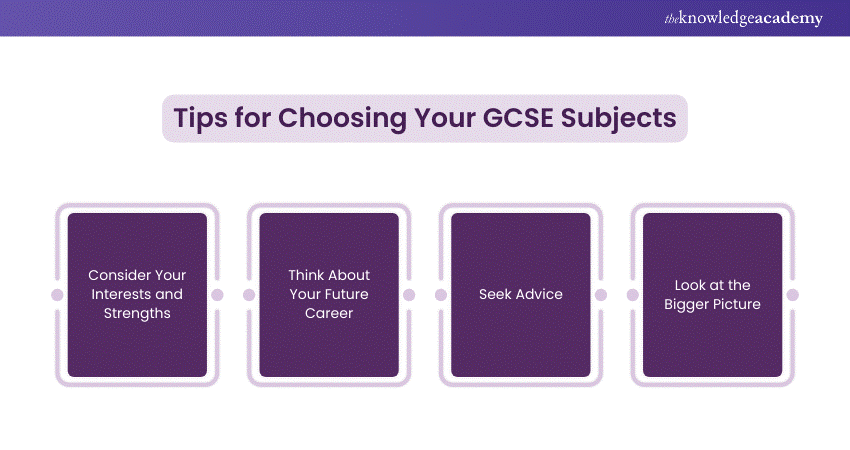We may not have the course you’re looking for. If you enquire or give us a call on +44 1344 203 999 and speak to our training experts, we may still be able to help with your training requirements.
We ensure quality, budget-alignment, and timely delivery by our expert instructors.

Choosing your GCSE options is an exciting milestone, marking the beginning of your academic and career path. With a plethora of subjects and limitless opportunities, the decision can indeed feel daunting. But fear not—this blog is designed to illuminate the GCSE landscape, helping you navigate your choices with confidence and clarity. By the end, you’ll be well-equipped to make informed decisions that align with your interests and aspirations, setting you on the path to success.
Table of Contents
1) What Are GCSEs?
2) When Do I Need to Select My GCSE Options?
3)Which GCSE Subjects Are Mandatory?
4) What Optional GCSE Subjects Are Available?
5) What If I’m Unsatisfied with My Choices After Starting?
6) Tips for Choosing Your GCSE Subjects
7) Conclusion
What Are GCSEs?
GCSEs, or General Certificate of Secondary Education, are qualifications students typically take in the UK around 16. These exams mark the end of compulsory education and cover many subjects. Your GCSE results are critical in determining your next steps—further education, vocational training, or entering the workforce.
The significance of GCSEs cannot be overstated, as they lay the foundation for your future academic and career prospects.
When Do I Need to Select My GCSE Options?
The process of selecting GCSE Options usually begins in Year 8 or 9, depending on your school. This decision-making period is crucial, as your chosen subjects will dictate most of your study time for the next two years. It’s important to start considering your options early and discussing them with teachers, parents, and friends. This ensures you’re making informed decisions aligning with your interests and goals.
Which GCSE Subjects Are Mandatory?
Regardless of your school, certain subjects are compulsory for all students. These typically include English Language, English Literature, Mathematics, and Science (either combined or as individual subjects like Biology, Chemistry, and Physics). Some schools may also require subjects like Physical Education (PE) or Religious Studies. These mandatory subjects are designed to provide a well-rounded education and essential skills for everyday life.
Master the art of productivity—join our Time Management Training and take control of your time today!
What Optional GCSE Subjects Are Available?
Alongside the mandatory subjects, students can select optional GCSE subjects that align with their interests and future aspirations. Options can range from the humanities, like History or Geography, to creative arts, like Music, Art, and Drama, to technical subjects, like Computer Science or Design and Technology. The availability of specific subjects may vary by school, so it’s important to explore all your options before making a final decision.
What If I’m Unsatisfied with My Choices After Starting?
It’s common to feel uncertain about your choices once you’ve started your GCSE courses. If you find that a subject isn’t what you expected or you’re struggling, don’t panic—most schools have a window at the beginning of Year 10 where you can switch subjects.
However, this option may not be available for all subjects, and it’s important to discuss any changes with your teachers and parents to ensure they’re the right move for you.
Enhance your focus and boost productivity—sign up for our Attention Management Training now!
Tips for Choosing Your GCSE Subjects
Choosing the right GCSE Options can be daunting, but there are several strategies to help you make the best decision:

a) Consider Your Interests and Strengths: Choose subjects you enjoy and excel in, as this will keep you motivated.
b) Think About Your Future Career: If you have a career in mind, research which subjects might be beneficial.
c) Balance Your Workload: Don’t overload yourself with too many challenging subjects; aim for a mix that keeps you engaged without being overwhelming.
d) Seek Advice: Talk to teachers, career counsellors, and family members for guidance.
e) Look at the Bigger Picture: Consider how your choices align with future higher education or vocational training opportunities.
Tell compelling stories and make an impact—start your journey with our Journalism Course today!
Conclusion
Navigating your GCSE Options might seem challenging, but with the right guidance, it can also be an exciting opportunity to shape your future. By understanding what’s required, exploring your interests, and seeking advice, you can make informed choices that set you on the path to success. Remember, these decisions are the stepping stones to your future aspirations—choose wisely, and you’ll be well-prepared for whatever lies ahead.
Land your dream job faster—Join our Job Search Course today!
Frequently Asked Questions

Yes, many schools allow students to change their GCSE subjects early in Year 10 if they find that a subject isn’t what they expected. However, this option might not be available for all subjects, so discussing any potential changes with your teachers as soon as possible is essential.

If you don’t pass a GCSE subject, especially in core subjects like English or Mathematics, you may be required to retake the exam. Many schools and colleges offer support for retaking GCSEs, and passing these exams is important for future education and employment opportunities.

The Knowledge Academy takes global learning to new heights, offering over 30,000 online courses across 490+ locations in 220 countries. This expansive reach ensures accessibility and convenience for learners worldwide.
Alongside our diverse Online Course Catalogue, encompassing 19 major categories, we go the extra mile by providing a plethora of free educational Online Resources like News updates, Blogs, videos, webinars, and interview questions. Tailoring learning experiences further, professionals can maximise value with customisable Course Bundles of TKA.

The Knowledge Academy’s Knowledge Pass, a prepaid voucher, adds another layer of flexibility, allowing course bookings over a 12-month period. Join us on a journey where education knows no bounds.

The Knowledge Academy offers various Personal Development Courses, including the Career Development Course, Time Management Training and Attention Management Training. These courses cater to different skill levels, providing comprehensive insights into How to Become a Teaching Assistant
Our Business Skills Blogs cover a range of topics related to Career Development, offering valuable resources, best practices, and industry insights. Whether you are a beginner or looking to advance your Career Development skills, The Knowledge Academy's diverse courses and informative blogs have got you covered.
Upcoming Business Skills Resources Batches & Dates
Date
 Career Development Course
Career Development Course
Fri 28th Feb 2025
Fri 4th Apr 2025
Fri 27th Jun 2025
Fri 29th Aug 2025
Fri 24th Oct 2025
Fri 5th Dec 2025







 Top Rated Course
Top Rated Course



 If you wish to make any changes to your course, please
If you wish to make any changes to your course, please


